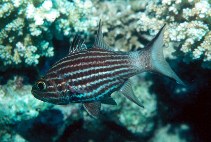| Family: |
Apogonidae (Cardinalfishes), subfamily: Apogoninae |
| Max. size: |
25 cm TL (male/unsexed) |
| Environment: |
reef-associated; marine; depth range 0 - 100 m |
| Distribution: |
Indo-Pacific: Red Sea and East Africa (Ref. 8525) to Pitcairn, north to the Ryukyu Islands, south to Lord Howe Island and Rapa. |
| Diagnosis: |
Dorsal spines (total): 7-7; Dorsal soft rays (total): 9-9; Anal spines: 2-2; Anal soft rays: 8-8. Characterized by having dorsal fin rays VI-I, 9; anal fin rays II,8; pectoral fin rays 12; pelvic fin rays I, 5; pored lateral line scales 25; predorsal scales 6; circumpeduncular scales 12; large canine-like teeth on jaws; preopercular margin serrated (Ref. 93839).; juveniles have a large black blotch on the caudal peduncle which becomes diffuse with age. Adults resemble adults of C. artus, but have wider stripes with darker interspace (Ref. 37816); characterized further by pale grey color; eight red-brown stripes on side, caudal fin base whitish; dark caudal fin margins; greatest depth of body 3.1-3.8 in SL (Ref. 90102). |
| Biology: |
Common in outer reef slopes in 4-30 m depth; in caves and ledges of clear lagoon and seaward reefs from 0.5 to at least 40 m, generally hovering solitarily in midwater (Ref. 1602). Adults usually in pairs or small groups comprising several pairs; juveniles solitary or small groups (Ref. 48635). Feeds primarily on small fishes (Ref. 9710). Sexual maturity reached at about 8 cm. Maximum depth reported taken from Ref. 128797. |
| IUCN Red List Status: |
Not Evaluated (N.E.) Ref. (130435)
|
| Threat to humans: |
harmless |
Source and more info: www.fishbase.org. For personal, classroom, and other internal use only. Not for publication.

